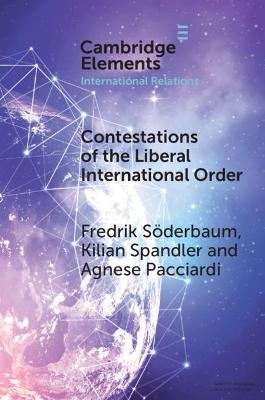
Contestations of the Liberal International Order
A Populist Script of Regional Cooperation
Seiten
2021
Cambridge University Press (Verlag)
978-1-009-01597-4 (ISBN)
Cambridge University Press (Verlag)
978-1-009-01597-4 (ISBN)
This Element unpacks the counter-intuitive inclination towards institutional cooperation in populist foreign policy and discusses its implications for the Liberal International Order.
A seemingly never-ending stream of observers claims that the populist emphasis on nationalism, identity, and popular sovereignty undermines international collaboration and contributes to the crisis of the Liberal International Order (LIO). Why, then, do populist governments continue to engage in regional and international institutions? This Element unpacks the counter-intuitive inclination towards institutional cooperation in populist foreign policy and discusses its implications for the LIO. Straddling Western and non-Western contexts, it compares the regional cooperation strategies of populist leaders from three continents: Hungarian Prime Minister Viktor Orbán, former Venezuelan President Hugo Chávez, and Philippine President Rodrigo Duterte. The study identifies an emerging populist 'script' of regional cooperation based on notions of popular sovereignty. By embedding regional cooperation in their political strategies, populist leaders are able to contest the LIO and established international organisations without having to revert to unilateral nationalism.
A seemingly never-ending stream of observers claims that the populist emphasis on nationalism, identity, and popular sovereignty undermines international collaboration and contributes to the crisis of the Liberal International Order (LIO). Why, then, do populist governments continue to engage in regional and international institutions? This Element unpacks the counter-intuitive inclination towards institutional cooperation in populist foreign policy and discusses its implications for the LIO. Straddling Western and non-Western contexts, it compares the regional cooperation strategies of populist leaders from three continents: Hungarian Prime Minister Viktor Orbán, former Venezuelan President Hugo Chávez, and Philippine President Rodrigo Duterte. The study identifies an emerging populist 'script' of regional cooperation based on notions of popular sovereignty. By embedding regional cooperation in their political strategies, populist leaders are able to contest the LIO and established international organisations without having to revert to unilateral nationalism.
1. Introduction; 2. The international dimension of populism; 3. Framework; 4. Viktor Orbán; 5. Hugo Chávez; 6. Rodrigo Duterte; 7. Comparison: identifying a populist script of regional cooperation; 8. Implications for research on the contestation of the LIO; 9. Conclusion; References.
| Erscheinungsdatum | 13.09.2021 |
|---|---|
| Reihe/Serie | Elements in International Relations |
| Zusatzinfo | Worked examples or Exercises |
| Verlagsort | Cambridge |
| Sprache | englisch |
| Maße | 151 x 228 mm |
| Gewicht | 146 g |
| Themenwelt | Sozialwissenschaften ► Politik / Verwaltung ► Europäische / Internationale Politik |
| Sozialwissenschaften ► Politik / Verwaltung ► Staat / Verwaltung | |
| ISBN-10 | 1-009-01597-4 / 1009015974 |
| ISBN-13 | 978-1-009-01597-4 / 9781009015974 |
| Zustand | Neuware |
| Haben Sie eine Frage zum Produkt? |
Mehr entdecken
aus dem Bereich
aus dem Bereich
Studienbuch
Buch | Hardcover (2023)
De Gruyter Oldenbourg (Verlag)
44,95 €
erfolgreiche Interessenvertretung durch Prozesskompetenz im komplexen …
Buch | Hardcover (2023)
Wiley-VCH (Verlag)
42,00 €


